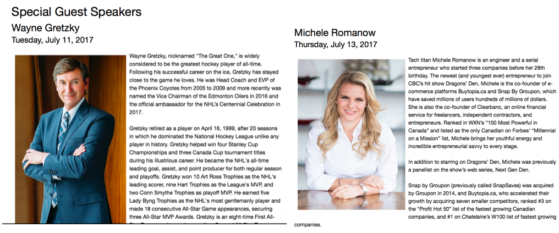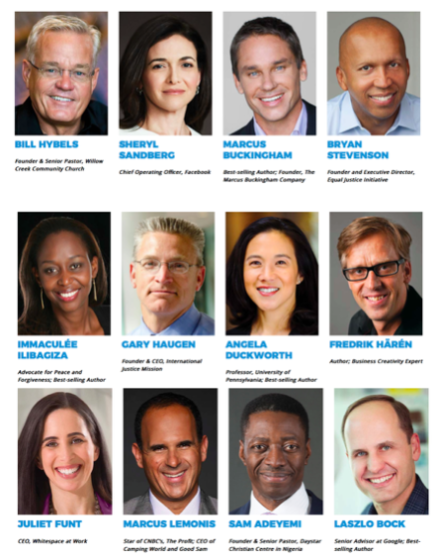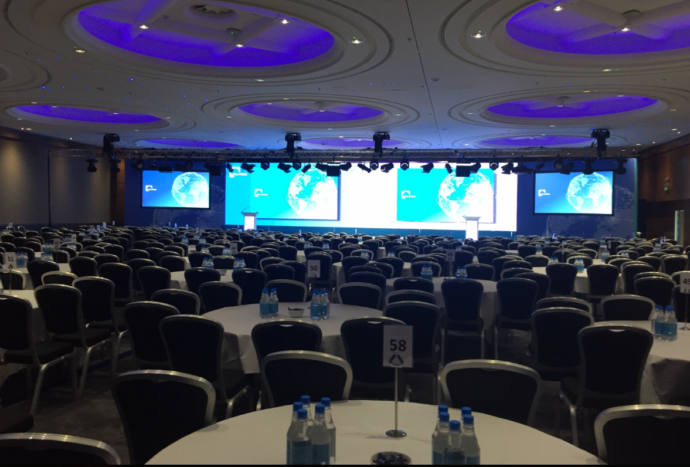
If you want to get the really big keynote bookings you have to understand that these bookings more or less only go to three kinds of speakers:
a) The famous person. (to give some star quality to the event and draw a crowd)
b) The Industry Expert (to give credibility to the event)
c) The really, really good speaker. (to inspire and awe the audience)
If you are not a) Famous or b) THE Industry expert you HAVE to understand that the path to getting the big keynote bookings is that you have to be a really, really good speaker.
Or to say it another way: If you are not yet getting those big, keynote speeches (and you want to) you have to work on either a) becoming famous, b) becoming known as a global industry expert – or c) make sure you develop yourself to be a really, really good speaker.
Let me give you two recent examples from two big conferences where I was one of the speakers to show that this is how it works:
1) OpenText.
Early July: Toronto, Canada, OpenText Global customer conference. 5000 in the audience.
Three days,
Three keynote speakers.
Day one: Wayne Gretzky – “The Great One” Say not more. (Famous)
Day two: Me. (Unknown and not industry expert.)
Day three: Michele Romanow – serial IT-entreprenur from Canada who sits on Dragon’s Den and is the youngest Dragon ever. (Industry Expert)
(From the program:)

2) Global Leadership Summit
Early August: Chicago, Global Leadership Summit, 10 000 live and 390 000 (!) people in 128 countries on video link.
First Speaker: Bill Hybels – Founder of Willow Creek and Global Leadership Summit (Industry Expert)
Second Speaker: Sheryl Sandberg – COO Facebook (Famous and Industry Expert)
Third Speaker: Marcus Lemonis – Billionaire and host of TV-show “The Profit”. (Famous and Industry Expert)
Fourth Speaker: Me (not an industry expert and not famous)
Fifth Speaker: Bryan Stevenson – New York Times #1 Bestseller and 3 million+ views on TED.com (famous)
As you can see, the other speakers are in category a) and/or b) (and sometimes a), b) and c)…)

But I am not famous. (I have, for example, about 6000 Twitter followers (which is nothing) and I am not a “house hold name”. (When I was introduced to the gold sponsors of the Global Leadership Summit on the evening before the Summit not 1 out of the 100+ people in the audience raised their hand when the moderator asked how many knew about me …
And I am not an industry expert on either leadership or IT by any stretch of the imagination.
That means that the ONLY reason I got selected to speak at these two big conferences was because the organisers thought that my qualities as a SPEAKER qualified me (and that my qualities as a speaker MADE UP for the fact that I am not famous or an industry expert. And also that my qualities as a speaker made me get the speaking slot over other good speakers who are famous and/or industry experts (there are, of course, no shortage of those, so they have to think my qualities as a speaker are so good that they put me on the stage even if they know that no-one in the audience will know who I am before I go up.)
And let me be very clear: I (!) do not think I belong in the category of “great speakers” either … But it doesn’t matter what you think of yourself as a speaker – what matters is what the people booking speakers think – and they apparently put me in the “C-category” of great speakers.
(I am also totally ok, with the fact that no-one knows who I am when I go up as I only care about the audience knowing who I am AFTER I am done with my speech.)
Both these two conferences are perfect examples of how the speakers got selected to stand on the main stage as main keynote speakers.
And both of these conferences could literally have chosen any speaker in the world.
So to summarise: To get the big keynotes you have to be: famous, be a global thought leader/authority on the subject – or you have to be good. Really good.
If you ask me c) is the easiest way to get those bookings. But it means you have to commit yourself 100% to developing yourself to becoming the very best speaker that you could possibly be.
Are you doing that?

